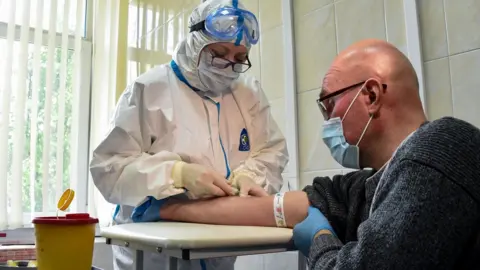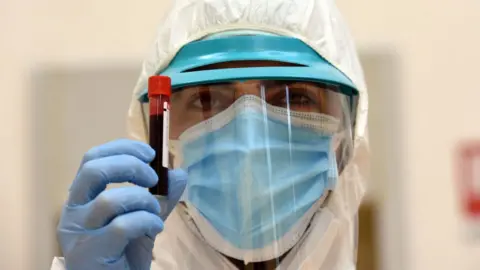Coronavirus: NHS England official cautions against buying antibody tests
 Getty Images
Getty ImagesPeople in England have been cautioned against using coronavirus antibody tests being sold by some retailers.
NHS England's medical director Prof Stephen Powis said experts were "evaluating" antibody tests, which show if someone has already had the virus.
Such tests are not yet available through the NHS, but some are being sold commercially.
"I would caution against using any tests... without knowing quite how good those tests are," said Prof Powis.
Currently, the coronavirus tests available to all adults and children aged over five are swab tests - taking a swab up the nose or from the back of the throat. These tests tell you if you currently have Covid-19.
A second type of test - the antibody test - is a blood test that looks for antibodies in the blood to see whether a person has had the virus.
Health officials in England have already approved an antibody test. There is no date for when it will be rolled out, but Health Secretary Matt Hancock said earlier this week the government was in "the closing stages of commercial negotiations".
On Wednesday, Superdrug became the latest business - and first high street retailer - to offer the antibody test. The kit costs £69 and buyers need to take a blood sample at home, which is sent off to a lab for testing.
Questions over immunity
Speaking at the No 10 daily briefing on Wednesday, Prof Powis said: "Public Health England have been evaluating the new antibody tests, the commercial tests that are becoming available."
But he added: "I would caution against using any tests that might be made available without knowing quite how good those tests are... I would caution people against being tempted to have those tests."

- RISK AT WORK: How exposed is your job?
- THE R NUMBER: What it means and why it matters
- LOOK-UP TOOL: How many cases in your area?
- GLOBAL SPREAD: Tracking the pandemic
- RECOVERY: How long does it take to get better?

Setting out some of the uncertainties around the commercial tests, Prof Powis said: "Once you have the virus, the body's immune system develops antibodies against it and it's those antibodies that are detected typically a number of weeks after you've had the virus.
"What we don't absolutely know at the moment is whether having antibodies and having the antibodies that are tested in those tests means that you won't get the virus again.
"So I wouldn't want people to think just because you test positive for the antibody that it necessarily means that you can do something different in terms of social distancing, in the way you behave.
"Because until we are absolutely sure about the relationship between the positive antibody test and immunity, I think we as scientists would say we need to tread cautiously going further forward."
Superdrug said it was "confident" in the accuracy and reliability of the test, which it said has a sensitivity of 97.5%. That means it will detect positive antibodies 97.5% of the time, so there is a chance a negative result may be wrong.
There is a variation in the accuracy of tests. A test developed by scientists in Scotland and Switzerland had a 99.8% accuracy rate for giving a positive result.
Dr Colin Butler, from the University of Lincoln, said the commercial tests "should give a good indication" of whether an individual has been infected with Covid-19.
But he added: "Whilst this may be an indication of functional immunity, confirmation of this is awaited from large scale studies presently under way. Until it is, individuals should not assume they are fully immune to further infection."
 Getty Images
Getty ImagesThe World Health Organization says there is no evidence people who have recovered from Covid-19 and have antibodies are protected from being infected again.
The new coronavirus, called Sars-CoV-2, has not been around long enough to know how long immunity lasts, but there are six other human coronaviruses that can give a clue.
Four produce the symptoms of the common cold and immunity is short-lived. In two coronaviruses - the ones that cause Severe Acute Respiratory Syndrome (Sars) and Middle East Respiratory Syndrome (Mers) antibodies have been detected a few years later.
